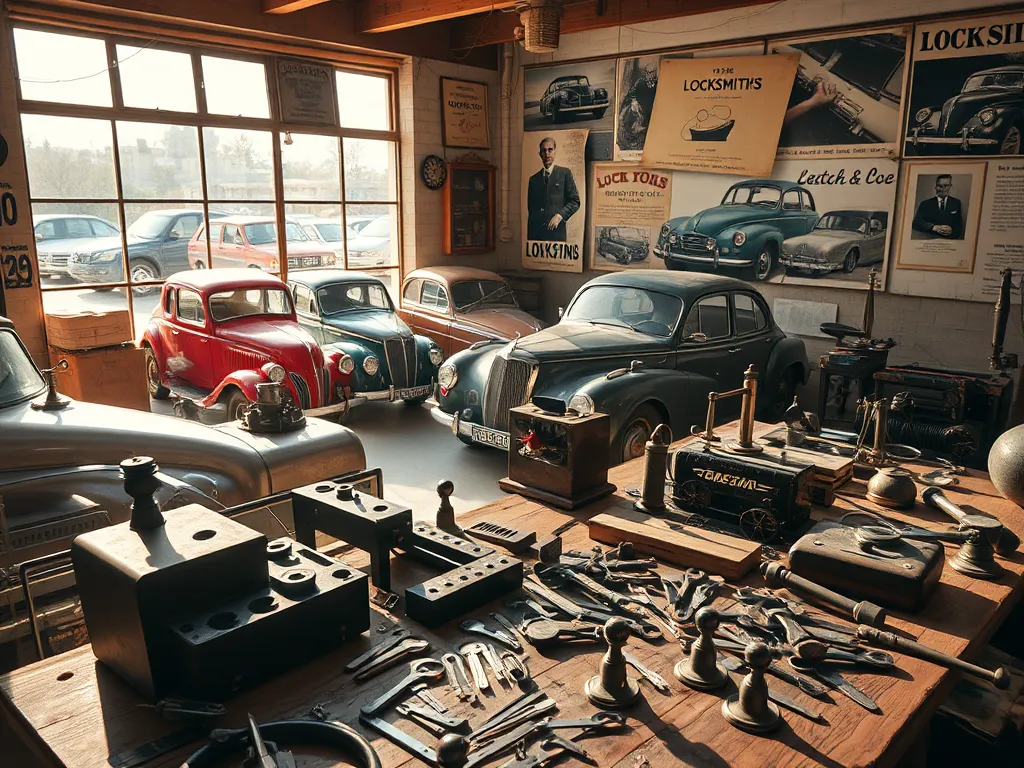Exploring The History of Automotive Locksmith Services

The History of Automotive Locksmith Services
The History of Automotive Locksmith Services is a fascinating journey through time, showcasing the evolution of lock and key technology and the locksmith profession. As automobiles became an integral part of daily life, the need for specialized locksmith services grew, leading to the establishment of automotive locksmithing as a distinct field.
In recent years, advancements in technology have revolutionized vehicle protection, highlighting the impact of vehicle security advancements.
The emergence of the automotive locksmith profession can be traced back to the late 19th century, coinciding with the invention of the first motor vehicles. The History of Automotive Locksmith Services is marked by significant advancements in both vehicle technology and security measures.
As automobiles became more popular in the early 20th century, the need for automotive locks and locksmith services increased. With the rise of car ownership, The History of Automotive Locksmith Services reflects how locksmiths adapted their skills to meet the demands of vehicle security.
Throughout the decades, The History of Automotive Locksmith Services has been shaped by technological advancements, changing consumer needs, and regulatory challenges, making it a dynamic field that continues to evolve today.
Understanding The History of Automotive Locksmith Services provides insight into the locksmith profession's resilience and its crucial role in ensuring the safety and accessibility of vehicles.
Ongoing research has made significant strides in the locking industry, showcasing notable changes in key technology progress.
Early Beginnings of Locksmith Services
Locksmithing has ancient roots, dating back to around 4000 BC, with the invention of basic locking mechanisms made from wood. The earliest known locking systems were simple pin tumbler locks, which were used in ancient Egypt and Babylon. These locks required a wooden key to operate them, laying the groundwork for future developments in lock technology.
In ancient civilizations, locksmiths held a vital position, responsible for creating and repairing locks, which were essential for securing property and belongings. The role of locksmiths extended beyond mere mechanics; they were regarded as skilled artisans who contributed to the safety and security of their communities.
The evolution of tools has transformed the locksmith industry significantly, emphasizing the importance of the locksmith tool evolution.
As vehicles emerged in the late 19th century, traditional locksmiths began to transition their skills to accommodate the new automotive technologies, leading to the birth of automotive locksmithing as a specialized field.
Evolution of Automotive Locks
The introduction of key ignition systems in the early 20th century marked a significant advancement in automotive security. Those systems required a specific key to start the vehicle, emphasizing the need for more sophisticated locks and key designs.
With the development of standardized automotive keys in the 1920s, locksmiths began to create duplicate keys more efficiently. This period saw the emergence of various key shapes and sizes, further enhancing vehicle security while allowing for easier access for vehicle owners.
The transition to electronic locking systems in the late 20th century revolutionized automotive security. These systems often employed electronic fobs and transponders, requiring locksmiths to adapt their skills to handle new technologies and complex electronic systems.
Technological Advancements in Locksmithing
The impact of technology on lock design cannot be overstated. Modern locks are designed with heightened security features, including anti-pick and anti-drill measures, making it imperative for locksmiths to stay updated on the latest developments in lock design and manufacturing.
The integration of smart keys and keyless entry systems has transformed the automotive locksmith industry. These advanced systems use wireless technology to allow drivers to unlock and start their vehicles without traditional keys, posing new challenges and opportunities for locksmiths.
The emergence of mobile locksmith services has made it easier for customers to access locksmith help anytime and anywhere. Mobile locksmiths can quickly respond to emergencies, providing on-the-spot assistance for lockouts and other automotive security issues.
Key Milestones in Automotive Locksmith History
Significant inventions in automotive security, such as the ignition lock and steering column locks, have played pivotal roles in safeguarding vehicles. These innovations have greatly reduced theft rates and increased consumer confidence in vehicle safety.
Influential figures in locksmith history, such as Linus Yale Jr., have contributed to the standards and practices still in use today. Their innovations laid the groundwork for modern automotive locksmith services and establish reputable locksmithing practices.
Legislation affecting locksmith services has shaped the industry, ensuring that locksmiths maintain high standards of ethics and professionalism. Licensing requirements and regulations have helped to build consumer trust and protect the integrity of the profession.
Challenges Faced by Automotive Locksmiths
Dealing with lockout situations in modern cars presents unique challenges for automotive locksmiths. As vehicles become increasingly complex, locksmiths must be familiar with numerous locking mechanisms and the specific tools needed to address different lockout scenarios.
The rise of car theft and security concerns has made automotive locksmithing more critical than ever. Locksmiths are tasked with not only providing access to locked vehicles but also implementing security measures to prevent theft and unauthorized entry.
Evolving skills required in the locksmith field emphasize the importance of continuous training and adaptation. Automotive locksmiths must stay abreast of the latest technological advancements to remain relevant in an industry that is continuously evolving.